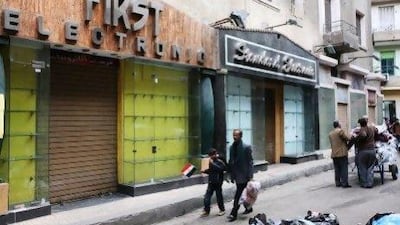The World Bank has come up with a novel plan to help rebuild "Arab Spring" economies - people power.
In a move to raise funds to reconstruct nations hit by unrest, the bank is recommending that bonds be issued and financed by nationals of those countries who work abroad.
So-called diaspora bonds could help to generate more than US$1 billion (Dh3.67bn) in each African nation, including those affected by unrest, said Dilip Ratha, a World Bank economist.
"The diaspora can be a friend in foul weather. If things are not going well in your country and foreign investors aren't there, the diaspora will still be there," said Mr Ratha, the manager of the migration and remittances development prospect group at the World Bank.
"Migrants [expat workers] from developing countries save about $400bn a year, which is mostly in deposits. Many countries in Africa can raise over a $1bn each [from expatriates]."
The uprisings that swept the Middle East this year have cost the most seriously affected countries more than $55bn, according to estimates this month by the political risk consultancy Geopolicity.
Libya is the only economy to have suffered major damage to its infrastructure through armed conflict. But other countries' ability to fund civil projects has been hobbled by dwindling public funds and high financing costs.
The World Bank believes diaspora bonds could help to meet some of the funding needs in the years ahead.
Egyptians working abroad send home about $7.7bn every year, more than the country receives in receipts from the Suez Canal. The amount of money sent home by Moroccans - about $6.7bn - exceeds the value of receipts from Morocco's tourism industry.
The World Bank estimates that foreign workers hold similar amounts in bank accounts in the countries in which they work. Much of the cash is in deposits offering a yield of only about 1 per cent, said Mr Ratha.
"Instead of 1 per cent interest rate, we would offer them a 4 per cent interest rate on a bond, giving them a greater return, and give them a tax break in their country of origin," he said. "Even if you sell small retail bonds of $100 million, because there are millions [in the] diaspora, you can raise billions of dollars for infrastructure projects."
As well as helping to raise cash for infrastructure projects and boosting the finances of migrants, diaspora bonds would serve other purposes.
After popular revolutions this year toppled the rulers of Egypt, Tunisia and Libya, many nationals are keen to help in rebuilding their countries' battered economies.
Selling bonds linked to a specific infrastructure project such as a school or hospital would tap into the desire of many people to make an emotional investment in the future of their countries, said Mr Ratha.
In addition, diaspora bonds could help with the development of capital markets and provide a long-term financing source for governments.
The World Bank is keen to offer technical expertise on the pricing and structure of diaspora bonds as well as acting as a broker between the governments issuing the bonds andtheir nationals working abroad.
Selling bonds linked to projects ring-fenced from political uncertainty would encourage investment in so-called Arab Spring economies at a time of instability, he said.
Diaspora bonds have helped countries as diverse as India and Israel to raise money. Greece said it would turn to its expatriates this year to help it raise extra funds.
The World Bank has advised the governments of Kenya and the Philippines on issuing diaspora bonds. The governor of Kenya's central bank estimated in July that the country could raise as much as $600m from its citizens domestically and abroad by the use of such bonds by the end of this year.

